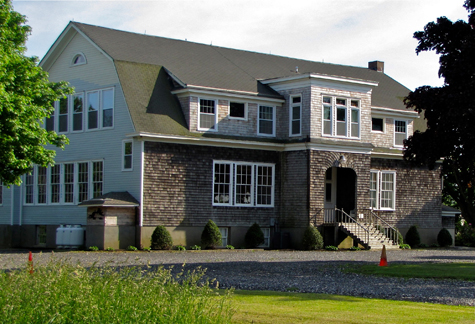Riverhead ZBA rejects microbrewery application, but will vote stick?

The Riverhead Zoning Board of Appeals denied an application by McCarthy’s on the Green to run a microbrewery out of the Old Northville School House on Sound Avenue Thursday night.
Or did they?
The board, which is already one member short because the Town Board has yet to fill a vacancy left the by resignation of Charles Sclafani, had only three voting members on this issue because ZBA member Leroy Barnes recused himself since he dealt with the property when he was the town building department head.
Of the three remaining members, ZBA chairman Fred McLaughlin and ZBA member Otto Wittmeier voted in favor of a resolution rejecting the application, while ZBA member Frank Seabrook voted for that resolution, meaning he supports the microbrewery.
In casting his vote, Mr. McLaughlin said the appeal had been denied.
But after the meeting, former town Councilman George Bartunek and former Riverhead school board member Angela DeVito, both of whom had spoken in opposition to the microbrewery, said they believed that unless there is a three-vote majority against the application, it is not necessarily denied.
ZBA attorney Scott DeSimone had left by then, and could not immediately be reached for comment, and town building and planning administrator Jeff Murphree said he’d have to research the issue.
Either way, it’s not certain if the would-be brewers are still interested.
Applicant George Greene of Wading River said after the meeting, “We have somewhere else we’re looking at, and it’s not in the Town of Riverhead.”
Mr. Greene and Tim McCarthy of Lake Grove, who own McCarthy’s Pub in Centereach, planned to lease space in the school house from its owner, John Reeve Jr., and build a microbrewery there.
They acknowledged that they would not initially be growing the grain and hops needed to make the beer, but would instead purchase it from elsewhere, possibly from East End farms that grow those ingredients.
During the course of about four public hearing on the proposal, representatives from a number of civic and environmental organizations voiced opposition, saying, among other things, that without growing the ingredients on site, the microbrewery couldn’t constitute an agricultural use and would be akin to a tavern, and that allowing it would set a bad precedent on Sound Avenue.
They also said it failed to meet the stringent criteria for a use permit, which the ZBA can grant to projects that don’t meet zoning requirements, so long as they meet a number of difficult criteria showing why permitted uses for the land wouldn’t work.
The application sought, among other things, a ZBA ruling on whether a microbrewery could be considered agricultural production.
John Ciarelli, the attorney for the applicant, said the building had been running into disrepair until Mr. Reeve bought it in 2009 and began fixing it up. But, he said. Mr. Reeve has been unable to find a suitable tenant that conforms with the uses permuted in the agricultural protection zone, in which it is located.
The ZBA decision said they did not feel the proposed use constituted agricultural production, as defined in the town code.
They also rejected the use permit application, stating that “the applicant, based upon the record presented, has failed to demonstrate competent financial evidence the property owner cannot realize a reasonable return for each of the permitted and specially permitted uses in the APZ,” as they must do in order to get a use permit.
The ZBA also rejected their request to convert an existing use that is non-conforming with zoning to another non-conforming use, saying they presented no evidence to show that a non-conforming use legally exists there in the first place.







